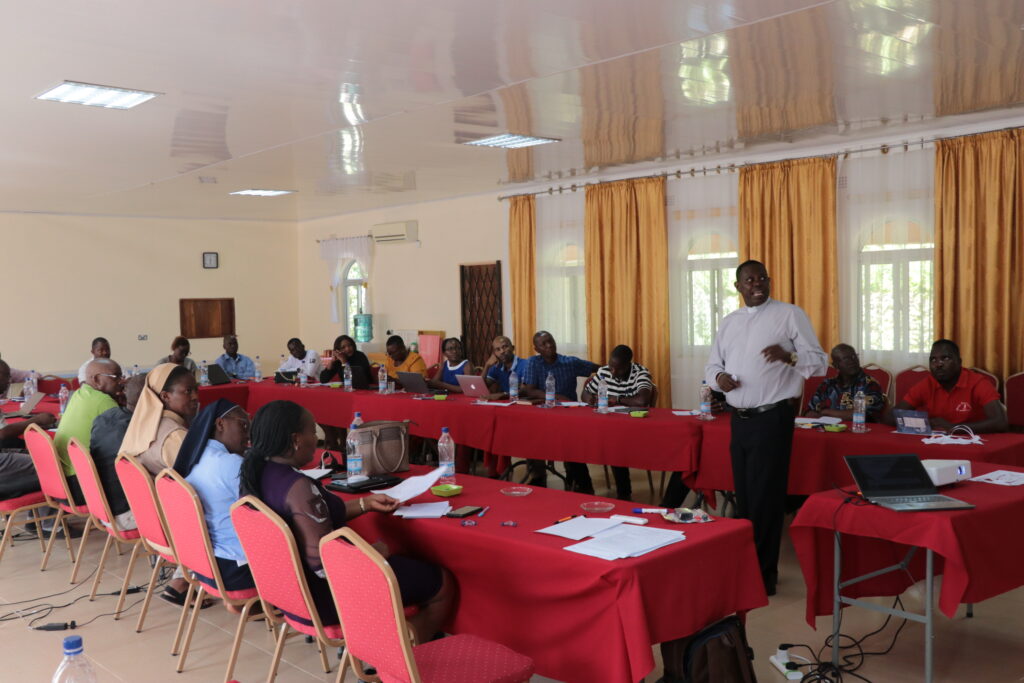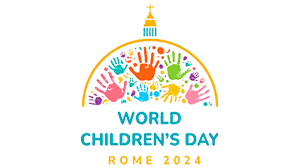AMECEA: Catholic Communicators Urged to Lobby for Ecological Conversion

Rev. Fr Paul Igweta Making a presentation
Sr. Jecinter Antoinette Okoth, FSSA
A section of Catholic communicators from the Association of Member Episcopal Conferences in Eastern Africa (AMECEA) has been urged to better ways of influencing members of the society to rethink ecological conversion.
In his presentation to over 30 media practitioners from the Zambia Conference of Catholic Bishops (ZCCB) and Episcopal Conference of Malawi (ECM), the AMECEA’s coordinator for Promoting Integral Human Development (PIHD) Fr. Paul Mung’athia Igweta reminded the participants that they have a role to play on the conversion of people’s mindset through their profession.
“AMECEA Member Conferences developed guidelines to offer practical and contextual guidance towards the implementations of Pope Francis’ encyclical letter Laudato Si, and as communicators, the way you package stories and programs around these guidelines is very key,” Fr. Igweta told the participants who were following a training at Kasisi Retreat Centre, in Lusaka, Zambia on Wednesday, February 14.
He narrated that, in the encyclical that was published in May 2015 on care for our common home, “the Pope appeals for a new dialogue about how we are shaping the future of our planet and that we need a conversation that includes everyone since environmental challenges and its human roots are concerns that affect us all.”
The Kenyan cleric highlighted the practical guidelines in line with the seven Laudato Si goals which communicators need to focus on as they educate the society to re-awaken the spirit of love and care for the environment among Catholics and all the people of God.
In response to the cry of the earth, Fr. Igweta outlined ecological sensitivity, and protection of climate, biodiversity, waterways, and land as some key areas the society can focus on and which can be realized through; Installation of solar panels, insulating buildings, buying renewable energy, and installing more efficient cell stoves or appliances.
He added, “Other activities can be the use of biogas, wind energy, energy-saving stoves, energy-saving technology, heating, and transportation.”
Addressing the second Laudato Si goal in response to the cry of the poor by creating opportunities for the marginalized, the PIHD coordinator asked the communicators to develop programs that stress the aspect of protection of life through “educational events, ensuring clean water and training in hygiene, facilitating the installation of irrigation systems, food security, smart technologies, lobby to the respective government to control borrowing and over taxation of citizens and also to involve citizens in participatory decision-making process on environmental issues.”
Last year 2023, the AMECEA’s PIHD department began an awareness campaign on Laudato Si implementation guidelines in the region to help strategize how the guidelines can be spoken about and understood in dioceses, parishes, various groups in the Church including Small Christian Communities (SCCs).

Speaking on ecological economic empowerment as a third Laudato Si goal the cleric who has been at the helm of AMECEA’s PIHD department since 2018called for, international use of non-woven materials instead of polythene bags, recycling waste materials like kitchen wastes, minimal use of printing papers, plastic water bottles as well as training and homilies be conducted on circular economy.
Additionally, communicators were urged to champion renewable and green energy, remind the people of God to undertake due diligence to establish ethical administration of temporal goods in the formation of priests and agents of evangelization, and at the same time advocate initiatives against fossil fuels such as coal and oil.
For the adoption of simple sustainable lifestyles as the fourth goal, Fr. Igweta reinforced installation of clean and efficient lighting, reduced use of heating and air conditioning, installation of low-flow taps, and increased use of electric vehicles or bicycles to replace air and auto trips. While environmental education and training as the fifth Laudato Si’ goal underscores researching environmental crises, creating awareness of local ecosystems and ecological crises, training community resource management groups to overcome the crisis, and using Competency-Based Curriculum to engage government actors and teachers to roll out responses to Laudato Si.’
in conclusion, the cleric pointed out that the last two goals on ecological spirituality through evangelization and the call to community engagement and participatory action urge the Catholic bishops to plan and develop a pastoral letter on the season of creation, Celebrate the season of creation in September every year with liturgies to guide meditation topics for each week and international day such as world environmental Day and develop homily guides that are geared toward environmental justice.
Consequently, there is a need to translate and simplify policies for easy understanding, advocate for policies and budgets that respond to emergencies and disaster management, lobby for the implementation of policies as well as promote meaningful participation in policy and decision-making as the community sets environmental targets like planting a certain number of trees and participate in its implementation.


